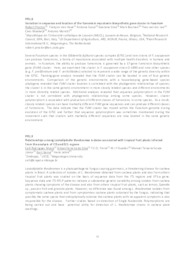Relationships among Lasiodiplodia theobromae isolates associated with tropical fruit plants inferred from the analysis of ITS and EF1-a gene.
Relationships among Lasiodiplodia theobromae isolates associated with tropical fruit plants inferred from the analysis of ITS and EF1-a gene.
Autoria: MUNIZ, C. R.; SILVA, G. F. da; FREIRE, F. das C. O.; GUEDES, M. I. F.; SOUZA JUNIOR, M. T.; KEMA, G.; JALINK, H.
Resumo: Lasiodiplodia theobromae is a phytopathogenic fungus causing gummosis,a threatening disease for cashew plants in Brazil A collection of isolates o f L.theobromae obtained from cashew plants and also from others tropical frui tplants was studied on the basis of sequenced at a from the ITS regions and EF1?? gene. Sequenced at a and ITS?RFLP pattern s indicate a substantial genetic variability among isolates from cashew plants showing symptoms of the disease and also from others tropical fruit plants, such as lemon, Spondia sp., passion fruit and graviola plants. However, nodifference was found among L. theobromae isolates from symptomatic cashew plants and from symptom less cashew plants colonize d by the fungus, indicating that possibly the same s pecie tha t endophytically colonize the cashew plants with no apparent symptoms is also responsible for the disease .Further studies based on detection of Single Nucleotide Polymorphisms are being carried out and have potential utility for detection of L. theobromae strains in cashew plant seedlings.
Ano de publicação: 2010
Tipo de publicação: Resumo em anais e proceedings
Unidade: Embrapa Agroindústria Tropical
Palavras-chave: Análise de e-EF1, Lasiodiplodia Theobromae
Observações
1 - Por padrão são exibidas publicações dos últimos 20 anos. Para encontrar publicações mais antigas, configure o filtro ano de publicação, colocando o ano a partir do qual você deseja encontrar publicações. O filtro está na coluna da esquerda na busca acima.
2 - Para ler algumas publicações da Embrapa (apenas as que estão em formato ePub), é necessário ter, no celular ou computador, um desses softwares gratuitos. Sistemas Android: Google Play Livros; IOS: iBooks; Windows e Linux: software Calibre.
Acesse outras publicações
Acesse a Base de Dados da Pesquisa Agropecuária (BDPA) para consultar o acervo completo das bibliotecas da Embrapa.

